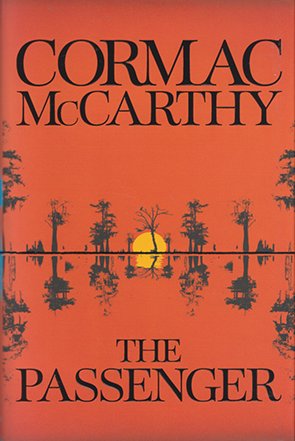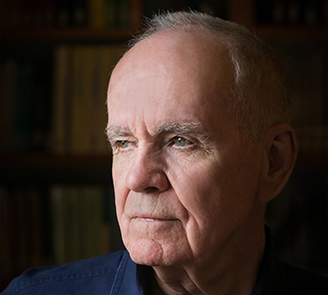The Passenger is Cormac McCarthy’s first novel since The Road, published in 2006: a long hiatus which is heralded not by one, but two books this year. The Passenger is the first of two novels about Bobby Western, a salvage diver, and his sister, Alicia, formerly a psychiatric patient with a phenomenal intelligence, now dead by her own hand. However, as I write this review, Stella Maris, the second novel, isn’t due for release in Australia for another three weeks, so this review is based on knowledge of The Passenger only.
The Passenger begins with a prologue about the finding of Alicia’s body, dramatically displayed in the forest to ensure she is found. While the novel is primarily Bobby’s story, Alicia’s presence in Bobby’s life is evident through interspersed chapters entirely in italics, which present as a surreal counterpoint to the main narrative. Alicia is rumoured to have been Bobby’s incestuous lover, but we sense that their relationship was marked by a heightened intellectual and emotional connection. The novel begins with an insight into Alicia’s mind rather than immediately beginning with Bobby’s story. It introduces us to a yet-unnamed Alicia and her companion, the Thalidomide Kid, a character with flippers instead of hands, a product entirely of her schizophrenic imagination, who challenges and teases at her, as she seeks to come to terms with her existence. He introduces a menagerie of peculiar people who hover at the margins of Alicia’s consciousness. The effect of the opening is somewhat disorientating, as Alicia’s situation seems to have nothing to do with the main narrative for quite some time, and the reader is left to piece together the relationship between this and Bobby’s story. Bobby, is first mentioned as a coma patient in Alicia’s discussion with the Thalidomide Kid. Bobby, it appears, has been injured after a motor racing accident, although it becomes clear in the succeeding chapters, he is well over his injuries.
So, The Passenger does not open with the main story or represent the main narrative style, but as the story of Bobby Western begins to be told, the emerging plot also begins to defy expectations McCarthy teases from the reader. The opening chapters of Bobby’s story is typical of a thriller, although the book does not develop, later, as a thriller would. It’s 1980 and a small aeroplane has been discovered, sunk off the coast of Pass Christian, Mississippi. Bobby Western and his team dive down to the plane and find passengers still strapped in their seats. They appear to have been dead beforehand. There seems to be no evidence of damage from a crash. The Jepp case and data box are missing from the plane, and there is evidence that a passenger is missing, too. Nothing about the site makes sense, and Bobby wonders how the plane could have been found by a fisherman, as he has been told it was, and who might have accessed the wreck before his team. His team begins to die, some in suspicious circumstances. Then, as he begins to wonder how the crash has remained out of the news, Bobby’s apartment is ransacked and he realises that he is the subject of someone’s scrutiny: more troubling, he seems to have excited the interest of government investigators who want to know what he has discovered about the crash; investigators willing to squeeze him over his tax affairs for leverage. Bobby realises he is in danger of going to jail.
Yet, The Passenger does not develop the usual tropes of thriller writing, even though Bobby’s response to the threat of his personal situation is typical of characters in this type of story; even though the plot has some developments we might expect from a thriller. Even so, there is no violent confrontation as we see in No Country for Old Men. This is not a book about getting to the heart of the truth – about the mysteries of the thriller plot – except if by ‘truth’ we mean an attempt to address the philosophical truths of our existence and what we believe. This may, on the surface, seem to be a bizarre turn for a thriller, but the emerging story is not as strained as one might imagine. Bobby clearly still grieves his dead sister and desires some kind of understanding about her death. And the idea of identity, particularly in the modern world, is often central to the impetus of thriller writing. The notion that we are the authors of our own lives, that we have autonomy and can define who we are is often challenged by the action of thrillers. Having an identity technologically stolen, the seizing of assets as a means to put pressure on a protagonist, the need to run and leave an old life behind, or being framed for a crime a character did not commit; all these tropes speak to the tenuous control over identity and autonomy. Walk around a corner and witness something you should not, and suddenly these threats come into play in the world of thriller writing.
What defines The Passenger against other thriller writing is that McCarthy is more interested in the philosophical import of this threat, rather than extinguishing it. That’s the purview of many thriller movies: the protagonist must regain their life and identity through actions which vanquish evil forces; evil forces which, as often as not, represent clandestine interests within the government. This is why guns seem so prevalent in this type of story, because guns in the American psyche equate to autonomy; as tools for negotiation, retribution and resolution. On the other hand, when Bobby asks Kline, a private investigator whose help he seeks, whether he should get a gun, Kline responds, “Statistically it will shorten your life, not lengthen it.” McCarthy’s novel is not about fantasies of moral retribution and righting the tables. Rather, he illuminates key aspects of American neurosis: who can I trust? how can I maintain independence? And larger questions: what do I believe about me, and about existence, itself?
To this end, the main plot is more reminiscent of Kafka than Grisham. In framing Bobby’s dilemma Kline states, “You’re not charged with anything. You’re just under arrest”, and encourages him to leave his car behind, which has been requisitioned by the IRS, rather than risk a confrontation. The crux of the investigation, Kline intuits, is that, “It has become more important to them to believe than to know”, and he asks Bobby, “What is it that you want to believe?” The idea of belief becomes important to the novel because it is central to a sense of who we are. A direct confrontation would risk self-definition against the monolithic ‘truth’ telling of the government.
Defining belief and identity requires a multifaceted instrument within the story. There is no fixed locus: instead, the idea of a fixed ‘self’ is problematized as a product of psychological, philosophical, ideological, scientific, religious and cultural dimensions of our life. Bobby rejects the notion of religion and God but not of prayer. His educational background is in physics – his father was a physicist who worked on the Manhattan Project – but he is aware how human and negotiable the certainties of science are in reality. Yet, in a manner metaphorically like Einstein’s relativity theory, the worth of our existence is intrinsically linked to our relationships with others, and maintaining whatever is important in our lives. In short, the self cannot exist as an entity separate to its environment and others.
The novel is filled with conversations that would be hard to imagine turning up in everyday experience, at least not as often as they appear in this book. It’s characteristic of McCarthy’s style which some readers may find difficult. He is prone to long digressions, contradictions, and elevated, sometimes almost Biblical language that belies the modern trend in fiction to simple diction. McCarthy draws us into the story through common tropes, and his characters usually speak with the typical brevity we expect his characters to use, but at the same time, with insight and knowledge beyond what we might expect of a novel attempting to ground its story in our ‘real’ world. Do babies cry because they are horrified by existence? Are we born with the capacity to see the miraculous? Is existence so pointless that we are better off never to have been born? Can we really see beyond the confines of our own self without fundamentally becoming a different person? And how tenuous is the legacy of humanity, from one generation to the next, from the moment children discover a book or an insight, or the moment they are set on a path, instead, to burn down the world? The novel is littered with philosophical questions like this and the consequences of trying to address them. Fans of McCarthy will love this, but a reader of popular fiction may find it a difficult slog in some sections. A long discussion about the history of 20th century physics comes to mind.
While some of these conversations sometimes feel shoehorned into the narrative, the general direction of the novel works well and this philosophising, strangely, does not overburden the story. This is because McCarthy successfully frames his philosophical purpose within popular tropes. While a threat against Bobby may not fully materialise in the usual manner of thrillers, it is displaced into popular conspiracy theories – the machinations of the deep state – with paranoid stories about the bugging of Russian typewriters in the Cold War, to fears about electronic currencies controlled by the government, to the ever-popular theories around the assassination of Kennedy. Bobby’s fears – the threats he faces – makes him an everyman for the paranoid observer.
I once read an essay which argued that the reason Casablanca was such a great movie was because it successfully incorporated every cliché it could muster into a compelling story that reflected the zeitgeist of its moment. The Passenger, I think, is similarly successful: it has a mysterious crash, government agents, the loss of a genius sister held in a mental asylum, characters living off the grid, conspiracies, a struggle to come to terms with the past and past relationships, as well as the philosophical underpinnings of a great novel. I’m looking forward to reading Stella Maris. ‘Stella Maris’ is the name of the institution Alicia commits herself to, so it seems reasonable to expect the second novel will focus more directly upon her (even though this book is indirectly about her, anyway), as she remains less accessible in The Passenger in the peculiar dream-like flashbacks in which she appears. I expect the second novel will reveal more about her character and her relationship with her brother. In the meantime, The Passenger is a compelling novel that delves into many aspects of modern life and American society, which makes it well worth a read.
For different perspective on The Passenger check out Mike's review on his own site, Books in a Dumpster, by clicking on the image below. Mike is a former reviewer for the Reading Project under the reviewer name ‘Hasty’.


 RSS Feed
RSS Feed Facebook
Facebook Instagram
Instagram YouTube
YouTube Subscribe to our Newsletter
Subscribe to our Newsletter






No one has commented yet. Be the first!